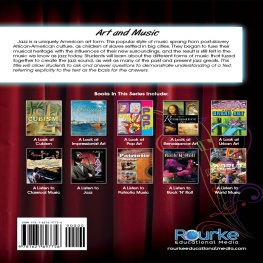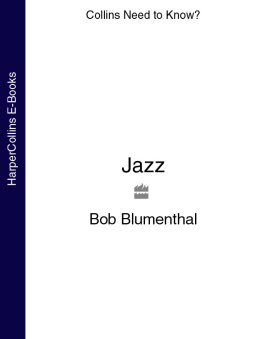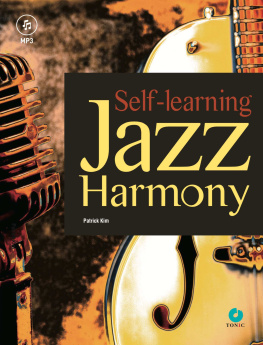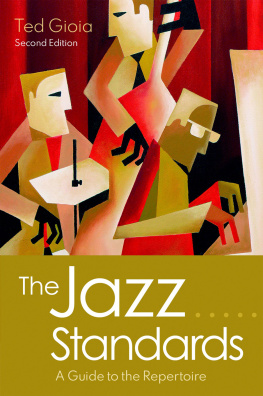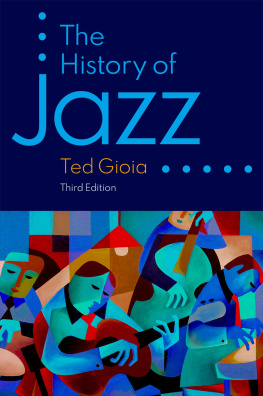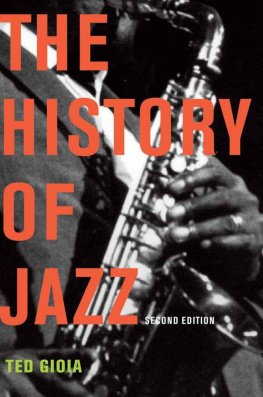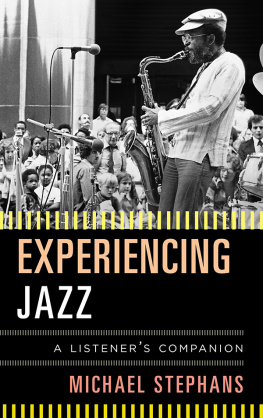Gioia - HOW TO LISTEN TO JAZZ
Here you can read online Gioia - HOW TO LISTEN TO JAZZ full text of the book (entire story) in english for free. Download pdf and epub, get meaning, cover and reviews about this ebook. City: Place of publication not identified, year: 2017, publisher: Basic Books, genre: Home and family. Description of the work, (preface) as well as reviews are available. Best literature library LitArk.com created for fans of good reading and offers a wide selection of genres:
Romance novel
Science fiction
Adventure
Detective
Science
History
Home and family
Prose
Art
Politics
Computer
Non-fiction
Religion
Business
Children
Humor
Choose a favorite category and find really read worthwhile books. Enjoy immersion in the world of imagination, feel the emotions of the characters or learn something new for yourself, make an fascinating discovery.

- Book:HOW TO LISTEN TO JAZZ
- Author:
- Publisher:Basic Books
- Genre:
- Year:2017
- City:Place of publication not identified
- Rating:5 / 5
- Favourites:Add to favourites
- Your mark:
- 100
- 1
- 2
- 3
- 4
- 5
HOW TO LISTEN TO JAZZ: summary, description and annotation
We offer to read an annotation, description, summary or preface (depends on what the author of the book "HOW TO LISTEN TO JAZZ" wrote himself). If you haven't found the necessary information about the book — write in the comments, we will try to find it.
An acclaimed music scholar presents an accessible introduction to the art of listening to jazz
HOW TO LISTEN TO JAZZ — read online for free the complete book (whole text) full work
Below is the text of the book, divided by pages. System saving the place of the last page read, allows you to conveniently read the book "HOW TO LISTEN TO JAZZ" online for free, without having to search again every time where you left off. Put a bookmark, and you can go to the page where you finished reading at any time.
Font size:
Interval:
Bookmark:
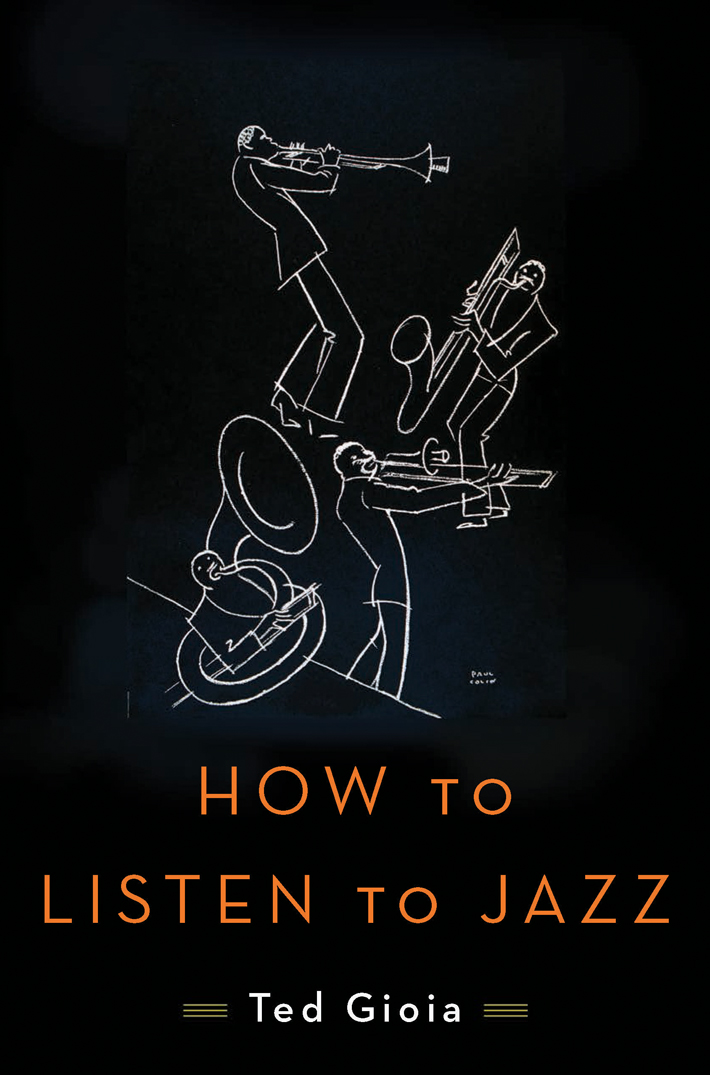


ALSO BY TED GIOIA
The History of Jazz
The Jazz Standards
Delta Blues
Work Songs
Healing Songs
Love Songs: The Hidden History
The Birth (and Death) of the Cool
The Imperfect Art: Reflections on Jazz and Modern Culture
West Coast Jazz: Modern Jazz in California 19451960
Copyright 2016 by Ted Gioia
Published by Basic Books, A Member of the Perseus Books Group
All rights reserved. Printed in the United States of America. No part of this book may be reproduced in any manner whatsoever without written permission except in the case of brief quotations embodied in critical articles and reviews. For information, address Basic Books, 250 West 57th Street, 15th floor, New York, NY 10107.
Books published by Basic Books are available at special discounts for bulk purchases in the United States by corporations, institutions, and other organizations. For more information, please contact the Special Markets Department at the Perseus Books Group, 2300 Chestnut Street, Suite 200, Philadelphia, PA 19103, or call (800) 810-4145, ext. 5000, or e-mail .
Library of Congress Cataloging-in-Publication Data
Names: Gioia, Ted.
Title: How to listen to jazz / Ted Gioia.
Description: New York : Basic Books, [2016] | Includes bibliographical references and index.
Identifiers: LCCN 2016000587 | ISBN 9780465097777
Subjects: LCSH: JazzAnalysis, appreciation.
Classification: LCC ML3506 .G55 2016 | DDC 781.65/117dc23
LC record available at http://lccn.loc.gov/2016000587
10 9 8 7 6 5 4 3 2 1
For my brother Dana, il miglior fabbro
Listening is the most important thing in music.
Duke Ellington
Table of Contents
Contents
What could be more mysterious than a work of music? When aliens arrive from their distant galaxy, they wont have much trouble understanding our food, sex, and politicsthose all make perfect sense. But they will scratch their green scaly heads at why people plug music into their ears or get up and dance when the band starts to play. Captain, we are unable to decipher the messages hidden in these three-minute bursts of sound, and the earthlings refuse to give us the code. The sci-fi movies have it all wrong: extraterrestrials wont waste time blowing up the Eiffel Tower and the White House. They will be too busy trying to figure out the significance of a Bach fugue, the rituals of the electronic dance music scene, and the rules of jazz improvisation.
And that jazz performance may puzzle them most of all. What could be stranger than a band playing the identical song, night after night, but making it different each time? How do you crack that code? How do you pinpoint the epicenter of the elusive quality known as swing, praised so lavishly by jazz fans but so resistant to explication or measurement? How do you grasp the structure of an idiom in which so much seems spontaneous, made up on the spot, and performed with headlong passion, yet is obviously driven by rock-solid ground rules and shaped by revered traditions? Above all, how do you penetrate the essence of a practice so imponderable that, when jazz icon Fats Waller was asked to define it, he allegedly warned, If you have to ask, dont mess with it.
Yet theres something almost as mysterious as jazz: namely, jazz critics. Who are these expert listeners, empowered to translate strange and wonderful sounds into a verbal description, assign a score or gradethis hot new record gets four stars!and then move on to the next song? Music, by definition, begins where linguistic meaning stops, yet these critics earn their living by breaching the boundary, reducing melodies to words, and somehow convincing the rest of us to give credence to their judgments. Aliens will certainly kidnap a few of these critics, plug them into the truth machine, and force them to explain the secret meanings of human music-making.
Of course, many earthlings are equally puzzled by critics. Where do those stars and scores come from? And the critics dont add to their credibility by their antics. Those well-known movie reviewers who decided to compress their erudite assessments into a hand gesturethumbs up or thumbs down, like spectators at a gladiator showdidnt do themselves or their profession any favors. Is it really that easy to be a critic? And what conclusion do we reach when we see one critic offer the thumbs up and the other give the thumbs down? If reviewing had any objective standards, and wasnt mere whim and opinion, wouldnt they agree most of the time?
The general public also holds a deep-seated suspicion, not entirely without justification, that the serious critics despise precisely those works of art that most people love. Box-office hits, best sellers, chart-topping singlesthey all are treated with scorn by these elitists, who then turn around and praise to the hilt some esoteric work no reasonable person would ever enjoy. Readers are often left wondering whether the authors arent simply trying to impress them with their hipness or faux sophistication, rather than offer an honest appraisal of the work at hand.
Critics add to this distrust by making their process seem opaque and mysterious. They are very quick to give a ranking to a work, assigning stars or scores or thumbs, but rarely tell us how these scales are constructed or what priorities are involved in their application. Music magazines publish countless reviews touting four- and five-star albums, and dismissing the inferior two- and three-star alternatives, but where do we find an in-depth description of the ranking system itself? What values do these rankings embody? What assumptions are built into the scores and rankings? If music fans probe deeper into the process, they encounter lots of specifics about individual recordings but almost nothing about how critical judgments are formed.
Even though I have worked for many years as a critic, I still know what its like to be a novice puzzled by the arcane aspects of the reviewers craft. In my mid-thirties, I lived in Napa for a year, and in order to have intelligent conversations with my neighborsalmost all of them worked in the wine industryI decided to improve my knowledge of grapes and vintages. This was a pleasant field of study, but I took it seriously and even shelled out some hard-earned cash to subscribe to a pricey newsletter by the influential wine connoisseur Robert Parker. Much to my surprise, I learned not only about wine but also some new twists on criticism. The sheer variety of ways he could describe the taste of a wine was stunning. With mouthwatering black and blue fruits distinctly tinged by fruit pits, smoked meat, chalk, and a medicinal iodine note, this formidably concentrated wine never forgets its duty to refresh. I could read a hundred or more of his short assessments of vintages at a sitting, and would soon forget about the wines, so lost was I in admiration of the many ways Parker had found to capture their ineffable qualities in words. How many ways can you describe the flavor of fermented grape juice? Parker never seemed to exhaust the possibilities, and at his best his descriptions possessed a certain wry poetry and metaphorical insight. I was writing a book on the history of jazz during that time in Napa, and I am convinced to this day that my own ability to describe music was improved by this immersion in wine culture and criticism.
Font size:
Interval:
Bookmark:
Similar books «HOW TO LISTEN TO JAZZ»
Look at similar books to HOW TO LISTEN TO JAZZ. We have selected literature similar in name and meaning in the hope of providing readers with more options to find new, interesting, not yet read works.
Discussion, reviews of the book HOW TO LISTEN TO JAZZ and just readers' own opinions. Leave your comments, write what you think about the work, its meaning or the main characters. Specify what exactly you liked and what you didn't like, and why you think so.

